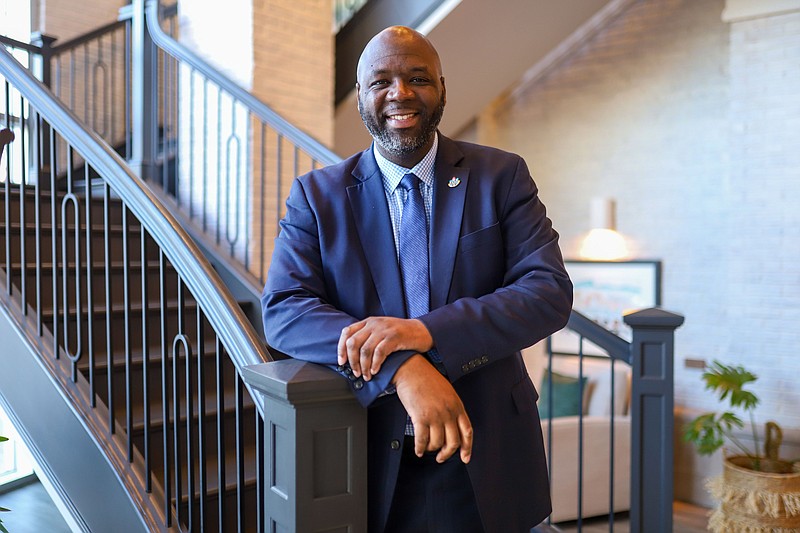What motivated Quentin Lawrence to become a minister? The easy answer would be the Lord, he jokes, but fundamentally, it was an inner calling to serve people.
"I've always been struck by glaring inequities and wanting to be a catalyst for change," Lawrence, who has been an ordained minister for about 20 years, said in an interview. "Growing up in Chattanooga ... you always hear about the tale of two cities, and I was very fortunate to see both sides."
That ethos has been a common thread in his career. After college, Lawrence moved to Dallas in 2003 for seminary and spent time in Atlanta. He joined the banking industry. Lawrence moved back to Chattanooga in 2013 and worked for Pathway Lending, where he was responsible for outreach efforts that included helping minority entrepreneurs secure capital.
In 2022, he took a job as director of workforce strategies under Chattanooga Mayor Tim Kelly, helping the city convene local partners in that ecosystem to connect people with training and employment opportunities. On Jan. 29, Lawrence started a new chapter — vice president of community investment at the Community Foundation of Greater Chattanooga.
There, he will oversee strategic investments, grantmaking for urgent needs like housing, homelessness and hunger, and the organization's community impact program, which also has a focus on boosting entrepreneurs of color.
(READ MORE: Google IT training at Chattanooga State offers pathway to economic prosperity)
"It really all comes around full circle," Lawrence said.
The Community Foundation works with more than 200 donors and donor families to advise them on how to best invest their money into causes they care about. Lawrence's department will help the organization identify those giving opportunities, whether that's addressing homelessness, faith-based issues or aiding children.
"We work with donors to really transform generosity into meaningful impact in our community, and we do that by having them identify what matters most and connecting them to immediate needs on the ground," Maeghan Jones, the president and CEO of the Community Foundation, said in an interview.
Kelly, who previously served on the board of the Community Foundation, said he doesn't feel as if Lawrence is leaving — there's not a hard barrier between City Hall and other groups active in promoting solutions to issues such as workforce development. Lawrence started at the city in August 2022 and earned a salary of $87,106, according to an employee roster.
"I see this as a lateral — not as a loss," Kelly said. "Because this in particular is one of those areas like education where Chattanooga has to leverage its historical strength in public-private partnerships to move big rocks, and this is the biggest of the big rocks to move."
Kelly said his One Chattanooga plan, a policy strategy aimed at addressing disparities, is about closing gaps and creating opportunity for residents. Workforce development is key.
"We can do all the economic development in the world, and if historically disadvantaged populations don't have the opportunities to climb into higher paying jobs, not only are we really just moving things around, we could make inequality worse," Kelly said.
Through its workforce development programs, the city is not trying to duplicate the work of its nonprofit partners, he said. Instead, Lawrence has acted as an orchestra conductor, ensuring groups were all on the same page and filling gaps where they existed. One example of that is a Google IT certification pilot program, which allows low-income workers to learn tech skills that can qualify them for IT-related jobs.
The city also recently received a $500,000 federal grant designed to help improve workforce outcomes in underserved neighborhoods in South Chattanooga and East Lake, particularly those where the median household income is approximately $10,000 less than the rest of the city. Barriers can include access to child care, transportation and a lack of training and education programs. The city is also one of 22 finalists for an implementation grant worth up to $50 million.
(READ MORE: Chattanooga's apprenticeship program praised as a national model)
Kelly said his administration is not yet searching for a replacement for Lawrence. His staff will meet with Chattanooga 2.0, the Benwood Foundation, the Chamber of Commerce and Hamilton County government to assess ongoing needs.
Presumably, the city does need someone in that role, Kelly said. The position could be expanded, in which case the city could add or adjust some positions, or it could be outsourced.
"There's never been a time that I can remember where we had the opportunity to positively reform the workforce development system like we do right now," Kelly said. "We're taking a pause and making sure that we get it right so we have the best chance of success."
Contact David Floyd at dfloyd@timesfreepress.com or 423-757-6249.
